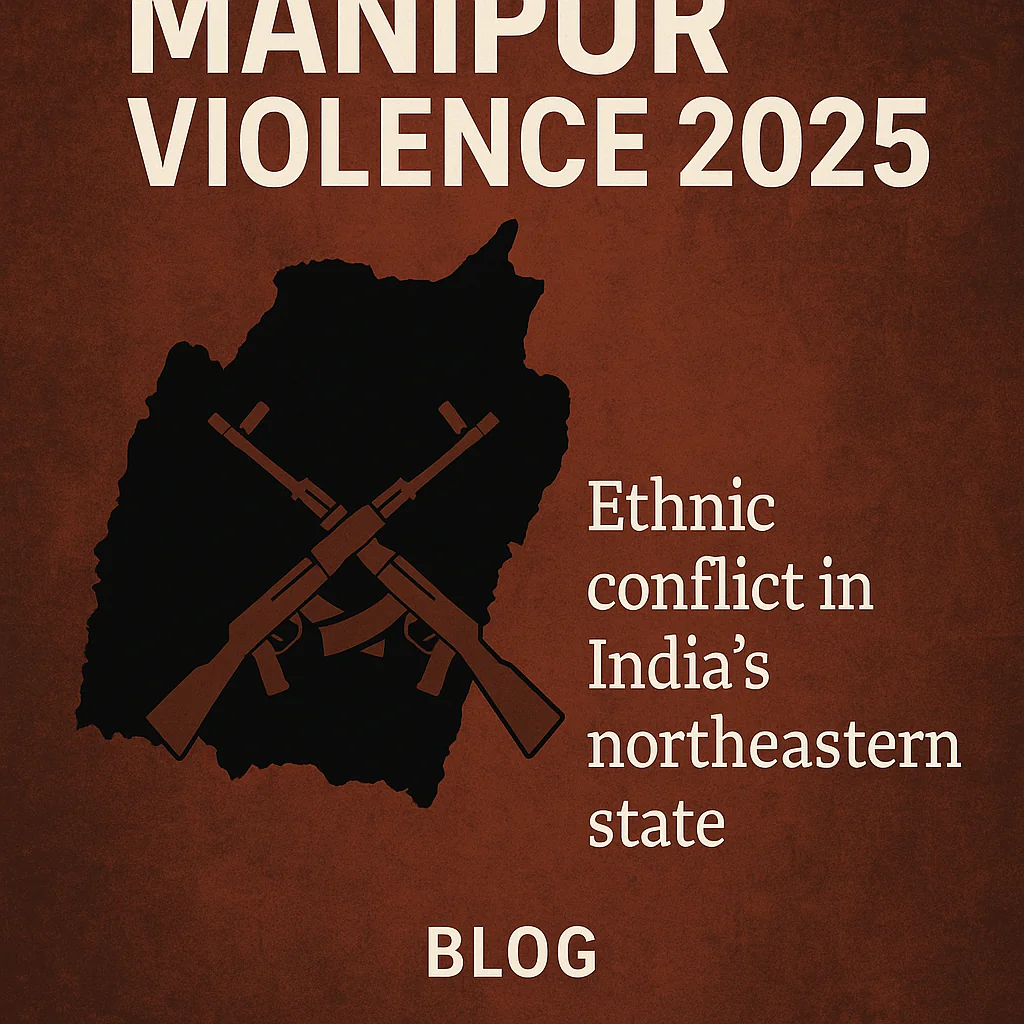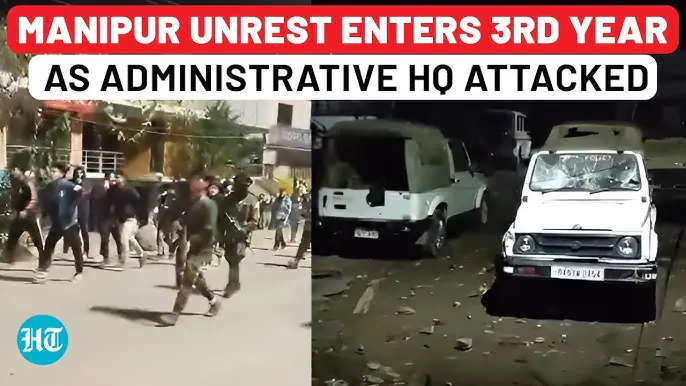✅ Introduction
Manipur Violence 2025 a northeastern state of India, continues to face severe ethnic violence between the Meitei and Kuki–Zo communities. What began as unrest in 2023 has escalated into an ongoing humanitarian and law-and-order crisis. In 2025, despite the imposition of President’s Rule, new clashes, internet shutdowns, and widespread curfews have reignited concerns over safety, stability, and governance.
This blog presents a comprehensive overview of the current situation, recent incidents, government response, humanitarian impact, and the historical roots of the conflict in Manipur Violence 2025.

https://acleddata.com/2025/05/16/political-violence-in-indias-manipur-state-2023-2025/
https://www.hrw.org/news/2025/03/27/india-ethnic-clashes-restart-manipur
🕵️♂️ ₹300 crore Ponzi scam in Maharashtra: The Full Story of Selva Kumar Nadar
Top 5 Emerging Technologies 2025 That Will Change the Next Decade
Earn ₹50000 Per Month Blogging – My Inspiring Journey to Success
AI Tools 2025: Powerful Solutions That Are Transforming How We Work
⚔️ Recent Clashes & Casualties
Manipur Violence 2025 on July 1, 2025, renewed violence broke out in Churachandpur, resulting in four fatalities, including a high-ranking member of a banned Kuki militant group and a civilian woman tragically caught in the crossfire. These incidents highlighted the growing internal rifts between rival Kuki factions, further complicating efforts for peace.
Multiple attacks across the state have triggered fresh fears and have further strained the already limited local resources and security forces in Manipur Violence 2025.
🔐 Security Measures & Paramilitary Deployment
In response to the increasing violence, the Central Government has deployed two additional battalions of CRPF personnel (about 2,000 troops). These forces are supporting local law enforcement in high-risk areas.
Since February 2025, President’s Rule has been enforced in Manipur. Officials report that it has helped reduce organized violence and curb illegal activities, including drug trafficking. However, sporadic clashes and insurgent activity continue to threaten stability in Manipur Violence 2025.
Curfews and Section 144 prohibitory orders remain in force in multiple districts, including Imphal East, Imphal West, Churachandpur, Thoubal, Kakching, and Bishnupur, limiting gatherings and movement to prevent further escalation.
🌐 Internet Shutdowns & Communication Blackouts
To counter misinformation and prevent unrest, the Manipur government has frequently suspended internet services. As of early June 2025, internet and mobile data services were suspended across five districts.
This follows a disturbing trend since 2023—when internet services were shut down for 212 consecutive days, one of the longest shutdowns in India’s history. While the government claims these actions prevent the spread of inflammatory content, rights organizations argue that such blackouts infringe on freedom of expression and significantly disrupt daily life in Manipur Violence 2025.
🚫 Impact on Civilians and the Economy
The violence has had a severe impact on ordinary citizens:
Highways and supply routes remain blocked, leading to shortages of food, fuel, and essential medicines.
Prices of daily commodities have soared, resulting in inflation and hardship, especially in districts like Churachandpur and Imphal.
Families relying on the internet for jobs, education, and healthcare access have been severely affected.
As of July 2025, over 60,000 people remain displaced, many of them living in relief camps under challenging conditions.
The economic strain and constant fear have left deep psychological scars on local populations, particularly youth and women in Manipur Violence 2025.
🧭 Root Causes of the Conflict
The roots of the Manipur conflict can be traced back to May 3, 2023, when protests erupted over the Meitei community’s demand for Scheduled Tribe (ST) status. This was opposed by the tribal Kuki–Zo community, who feared land and cultural encroachment in Manipur Violence 2025.
The conflict escalated into ethnic violence, with reports of:
Arson and looting
Destruction of homes and religious institutions
Formation of armed militias
Targeted killings and displacement
By 2025, over 250 people have been officially reported dead, and communal trust has almost completely broken down.
Additionally, recent cross-border tensions with Myanmar-linked fighters in the Chandel district have further aggravated the region’s instability.
🕊️ Efforts Toward Peace & Political Oversight
While President’s Rule brought some administrative stability, many citizens and rights groups accuse the government of bias and slow response. The central government, led by Union Home Minister Amit Shah, has initiated talks between Meitei and Kuki leaders to foster dialogue and reduce violence.
Some civil society organizations have also started peace campaigns, though their impact remains limited due to threats from extremist groups.
Most schools and colleges in sensitive districts remain closed. Educational activity is expected to resume only after the restoration of full internet access and assurance of safety.
🧠 Key Takeaways
| Aspect | Insight |
|---|---|
| Security | President’s Rule and added CRPF troops have helped contain violence but not eliminate it. |
| Digital Blackouts | Repeated internet bans restrict communication and harm civil liberties. |
| Humanitarian Crisis | Shortages, inflation, and mass displacement continue to affect civilians. |
| Ethnic Tensions | Rooted in socio-political and land issues, the conflict remains unresolved. |
| Peace Building | Government-led dialogues are ongoing but face mistrust and resistance. |
✅ Conclusion
The Manipur violence of 2025 is not just a law-and-order issue—it is a humanitarian and political crisis that demands urgent national attention. The ongoing ethnic tension between Meiteis and Kukis is deeply rooted in history, identity, and land rights.
While security forces continue to maintain order, long-term peace will only come through inclusive dialogue, justice, and reconciliation. Until then, the people of Manipur remain trapped in a cycle of fear, division, and uncertainty.
